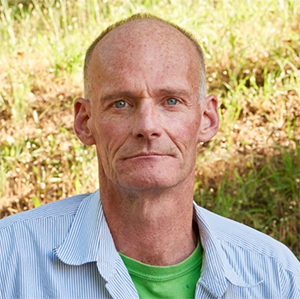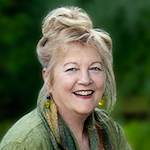Marin native Matt Tasley, a diagnosed schizophrenic and recovering alcoholic, used oil painting for his mental health. Until his schizophrenia diagnosis in 2001, Tasley initially coped with his mental health by self-medicating, using drugs and alcohol. In August of that year, he got clean, quit drinking, and remained sober until his death in 2020 at the age of 59. Friends and colleagues remember Matt Tasley as a kind man, a very talented artist, and a passionate advocate for those experiencing mental illness. Tasley’s longtime friend, Mary O’Mara, MarinLink’s executive director, said. “I’ve collected so many of his paintings. I met him through WildCare, years ago. He’d given up on painting in his journey to get sober. I encouraged him to try art again and took him to buy supplies… He painted our wildlife and donated the canvases for a fundraiser. He kept painting.”
Tasley used art as his therapy. Art therapy is commonly used as a tool for the interaction with subconscious ideas or feelings, and communication in psychotherapy. The act of artmaking can also have a soothing effect when used as a mindfulness practice, which can be a powerful tool for healing.
Mental Health and the Arts in Marin
Barbara Coley, who recently retired from her position as the Mental Health Program Director of Community Action Marin (CAM), isn’t shy about claiming the mantle of artist or about her challenges. “I am an artist, and I have a mental illness myself,” she explained, “I think we are all artists in one form or another. But, it takes courage to be an artist and say you are an artist.”
“I’ve known a lot of people who don’t necessarily do their art for their mental health, but it does help them with their mental health to express themselves. It diminishes isolation. When I was symptomatic, I was able to create, and I’d hear the voices abate. It really helped me. Art helps us feel connected. Art is a process, an exploration. When it is working really well, you come to epiphanies; you reach an understanding. It feels so good.”
– Barbara Coley, Community Action Marin
As Coley suggested, individuals are not necessarily drawn to art to address their mental health, but by itself, it can help. In the hands of a skilled art therapist, it can provide an important tool of expression and community connection. The American Art Therapy Association members, for example, are masters-level clinicians. Their practices include people of all ages and backgrounds who have a medical or mental health issue. They also work with people interested in using art for emotional, creative and spiritual growth.
“I am out in the community a lot, and get a lot of requests from teens for an arts and cultural center where they can come together, be creative and figure out their lives without the pressure of getting a grade,” comments Kelli Finley, Executive Director of the National Alliance of Mental Illness, Marin Chapter (NAMI). “They understand that technology is affecting them. They want something to diminish their sense of isolation and get them away from their phones and laptops.”
Finley also believes art can help reduce the stigma associated with mental illness. She created an artful and highly successful storytelling series called In Our Own Voice, which embraces all the senses – sight, hearing, taste, smell, and touch. Her speakers, gifted storytellers, have experienced mental illness. Finley creates an environment for the evening’s story with the speakers’ favorite colors, projected visual images, favorite music, and favorite food. All attendees receive a meaningful and helpful takeaway as a memento for the evening.
Art therapy is alive and well in Marin. For example, the public is invited to a recurring free event, Art Night with Blake. Scott Riley, the owner of Glaze and Confused pottery shop was approached by Blake Jordan, owner/artist of Rebellium Wines and Abby Yim, executive director of Integrated Community Services (ICS). This dynamic trio orchestrates art evenings for ICS clients who are individuals with developmental disabilities and those living with mental illness. Riley provides the venue, Jordan supplies the canvas and paint, and Yim provides the enthusiastic artists. Local restaurants donate nibbles.
Celebrating the Power of Healing, through the Arts

Before he died in a tragic accident after a mental health crisis, Tasley found healing and direction through art even with a difficult mental health diagnosis. Tasley’s diagnosis didn’t keep him from giving back to the community. He volunteered both through his work with Alcoholics Anonymous (AA) and as an art teacher and mental health advocate. He served on the NAMI Marin’s board, volunteered with Sunny Hills Transitional Age Youth programs, and Marin City Community Development Corporation’s Empowerment Clubhouse. In 2014, he received the Pacific Sun’s Heroes of Marin award for Courage
“Three things stand out about Matt. 1) He was completely committed to his art. 2) He never broke his sobriety even during six months of homelessness. 3) Fatherhood—he dearly loved his 3-year-old son. Matt faced many challenges, but he was a great and loyal friend. He stayed connected and touched the lives of hundreds of people,” comments longtime friend O’Mara.
Supporting Art Therapy in Marin
Tasley taught art at the Buckelew Programs. He also often donated paintings to Buckelew’s MarinScapes fundraiser, and became an effective mental health advocate through Buckelew. In addition to celebrating art through their annual fundraising event, Buckelew Programs also includes art therapy in its residential programs and transitional youth program, which provides housing and case management for 16-25 year olds who are at the onset of mental illness. Art therapy is part of their residential programs in various degrees, from licensed therapists to volunteers.
When art and community come together, the results are often a celebration. That’s been true for Buckelew Programs’ yearly MarinScapes event. For 32 years, this annual cultural event has provided the Marin community an opportunity to see and purchase award-winning art donated by local Marin and Bay Area artists to benefit programs supporting mental wellness, suicide prevention, and addiction recovery services in the North Bay. “This year, Buckelew will be celebrating our 50th Anniversary,” said Teri Cundall, Buckelew Programs’ communications and event manager. “So, while the Grand Finale is the last one, it is not the end. We bring MarinScapes to a close, and then will bring a new signature event to Marin.”
The Marinscapes event will be virtual this year. Learn more here.

Kate Fitzsimmons is a freelance writer and fund development professional. Her writing skills were honed as a Contributing Editor to The San Francisco Review of Books where she interviewed John Updike, Joyce Carol Oates, Bobbie Ann Mason, Alice Walker and others. She works with businesses, nonprofits and entrepreneurs to assist them in raising their visibility through their stories. When she isn’t writing, she is cooking for friends, collecting art or engaged in a good novel.